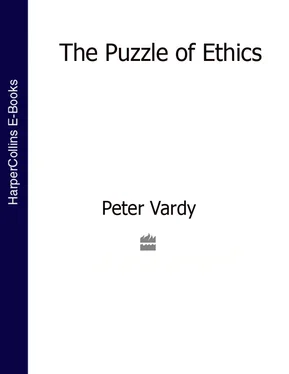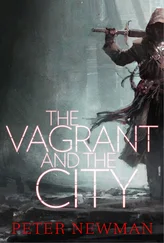Copyright
Fount Paperbacks is an Imprint of
HarperCollins Religious
Part of HarperCollins Publishers
1 London Bridge Street
London SE1 9GF
www.harpercollins.co.uk
First published in Great Britain in 1994 by Fount Paperbacks
This revised edition 1999
© 1994, 1999 Peter Vardy and Paul Grosch
Peter Vardy and Paul Grosch assert the moral right to be identified as the authors of this work
A catalogue record for this book is available from the British Library
Source ISBN: 9780006281443
Ebook Edition © MARCH 2016 ISBN: 9780007384051
Version: 2016-03-15
All rights reserved under International and Pan-American Copyright Conventions. By payment of the required fees, you have been granted the nonexclusive, nontransferable right to access and read the text of this e-book on-screen. No part of this text may be reproduced, transmitted, downloaded, decompiled, reverse-engineered, or stored in or introduced into any information storage and retrieval system, in any form or by any means, whether electronic or mechanical, now known or hereafter invented, without the express written permission of HarperCollins e-books.
HarperCollinsPublishers has made every reasonable effort to ensure that any picture content and written content in this ebook has been included or removed in accordance with the contractual and technological constraints in operation at the time of publication .
Praise for the first edition of The Puzzle of Ethics
‘A wonderfully clear introduction to moral philosophy and to various topics of contemporary ethical concern … This is a book for which many students and the general reader … will be grateful.’
David Atkinson
‘The great advantage of The Puzzle of Ethics over its rivals is that the authors are so thorough, so balanced and so clear. This is a good book.’
Robin Gill, The Tablet
‘The philosopher of religion and gifted communicator Peter Vardy … and Paul Grosch … provide an accessible, balanced and up to date introduction to moral philosophy.’
The Way
‘This book will fill an irritating gap in the current literature available and provide a valuable resource … Vardy and Grosch are serious commentators who have something to say to the general reader; as with all the Puzzle books, accessibility and clarity are the benchmarks of style.’
Peter Tyler, The Month
Dedication
To
Lindsay Grosch and Christian Vardy
– Again!
Contents
Cover
Title Page
Copyright
Praise
Dedication
Acknowledgements
PART ONE: THEORETICAL ETHICS
1 Setting the Scene
2 Plato – Virtue and Knowledge
3 Aristotle and Virtue Theory
4 Aquinas, Natural Law and Proportionalism
5 Kant and the Moral Law
6 Bentham and Mill – Utilitarianism
7 Post-utilitarian Perspectives:
Intuitionism
Emotivism
8 MacIntyre – Virtue Theory Revisited
9 Virtue Ethics
10 Situation Ethics
11 Justice and Morality – Rawls and Nozick
PART TWO: APPLIED ETHICS
12 Abortion and Personhood
13 Euthanasia and Medical Ethics
14 Just War
15 Crime and Punishment
16 Human Rights
17 Animal Rights
18 Environmental Ethics
19 Genetic Engineering
20 Media Ethics
21 Conclusion
Further Reading
Index
About the Author
About the Publisher
Acknowledgements
Both authors owe a great debt to their students past and present. Responsibility for the errors and omissions in this book rests entirely with the authors, however there would have been more of them were it not for the help of those who read individual chapters and offered their advice. Peter Vardy wishes to acknowledge help given by Michael Barnes SJ, Alan Carter, Bernard Hoose, Gerry Hughes SJ, Janice Thomas and Anne Vardy. Paul Grosch wishes to thank Adrian Mills and Alan Gorman for the many discussions on the nature of justice. He has also benefited from discussions with his colleagues: Dilys Wadman, Liz Stuart, Rachael Quinlan, Adrian Thatcher, Jim Little, Jon Goulding, Gordon Bartlett and Alan Cousins. He wishes to record his special thanks to Anne Littlejohn and David Benzie for their help in taming recalcitrant word-processors when time was fast running out.
PART 1
THEORETICAL ETHICS
ONE
Setting the Scene
Ethics is central to modern life. Lawyers, accountants, doctors, nurses, the police, members of the armed forces, social workers and many others are required to study ethical issues as part of their training. Before any ethical issue can be examined, however, it is first necessary to be clear on the underlying assumptions which govern the debate and, in particular, to understand the different ethical frameworks that can be applied. Unless one is clear on the assumptions, it will not be possible to understand the viewpoints of others or challenge one’s own.
Discussion of, for instance, abortion, euthanasia or sexual morality cannot usefully take place unless there has first been an examination of key issues which will include:
When does human life begin?
What is a human person?
Is life an absolute good?
Should governments seek to maximise freedom?
Is achieving the greatest happiness for the greatest number of people the main aim of politics?
Do you support a deontological or a consequentialist approach to ethics?
Can a proportionate reason ever justify going against a firm moral rule?
This book is divided into two parts. The first looks at the issues in theoretical ethics underlying the debates; then, in the second part, issues in applied ethics are dealt with. The aim of this book is to present the issues clearly so that you, the reader, can make your own decisions. There is no attempt to impose a particular agenda nor to persuade you to make the ‘right’ answer. Indeed, the whole idea of there being single ‘right’ answers in ethics has come under increasing attack. Some support a radical relativism in which each person’s view is as good as the next – but this carries its own problems. If this position is seriously held, then how does one condemn the behaviour of Pol Pot’s regime in Cambodia, those who took part in ethnic cleansing in Bosnia, or those who carried out the massacres in Rwanda?
The terms ‘ethics’ and ‘morality’ have come to be treated as almost identical in meaning, but they have different derivations. ‘Ethics’ comes from the Greek word ethikos which relates to ‘ethos’ or character. It is sometimes translated ‘custom’ or ‘usage’ so it refers to the customary way to behave in society. Ethical behaviour, therefore, is behaviour that is in accordance with a virtuous character. Aristotle uses the word in this way, maintaining that virtue is happiness, and that the pursuit of virtue is the highest and noblest aim for a human being. In his book The Nicomachean Ethics , Aristotle maintains that a human being’s highest happiness comes from philosophic speculation but that this must be combined with a life of prudence and a search for virtue. Becoming virtuous involves the individual establishing a habit of virtuous behaviour and this is directly related to a virtuous character.
‘Morality’ comes from the Latin word moralis – particularly as used in Cicero’s commentaries on and translations of Aristotle. Morality is more concerned with which actions are right or wrong rather than with the character of the person who performs these actions. Today the two terms, ethics and morality, are often interchanged with particular philosophers wishing to emphasise one or another aspect.
Читать дальше












